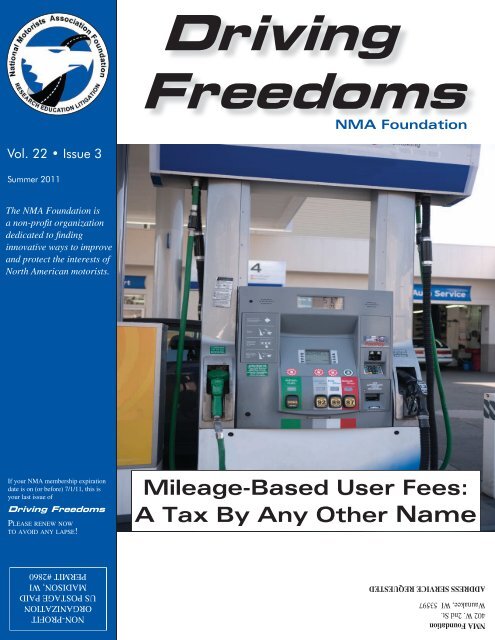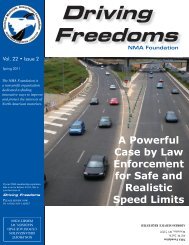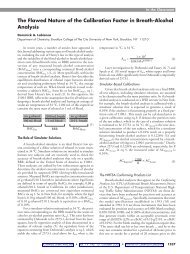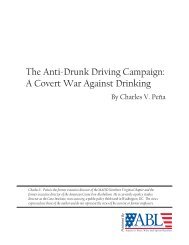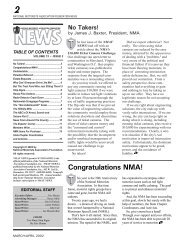Driving Freedoms - National Motorists Association
Driving Freedoms - National Motorists Association
Driving Freedoms - National Motorists Association
You also want an ePaper? Increase the reach of your titles
YUMPU automatically turns print PDFs into web optimized ePapers that Google loves.
Summer 2011<strong>Driving</strong> <strong>Freedoms</strong><strong>Driving</strong><strong>Freedoms</strong>Table Of ContentsVolume 22 • Issue 3Road Trip.......................................... 2Survey Says....Roundabouts............ 3NMA Washington Report................... 4Traffic Ticket Overhead..................... 6Mileage-Based User Fees................ 7Laws on Use of Electronic Devices... 9Members Write.................................11News From Around The Country..... 12Experts Corner................................ 13SCCs & Activists List....................... 14Copyright © 2011 by NMA Foundation.All rights reserved.<strong>Driving</strong> <strong>Freedoms</strong> (permit # 0716556-KWP) is theofficial publication of the NMA Foundation, Inc. <strong>Driving</strong><strong>Freedoms</strong> is published quarterly by the NMA Foundation,Inc., 402 W. 2nd St., Waunakee, WI 53597. (608/849-6000)Email: nma@motorists.org Web site: www.motorists.org.Nonprofit bulk permit paid Madison, WI. Annual membership inthe <strong>National</strong> <strong>Motorists</strong> <strong>Association</strong> includes a subscription to<strong>Driving</strong> <strong>Freedoms</strong>.Editorial StaffManaging Editor............................Gary BillerStaff Writer............................. James J. BaxterStaff Writer................................. Aaron QuinnStaff Writer.................................Robert TalleyEditor-at-Large.............................. Bill JordanCover“Mileage-Based User Fees:A Tax By Any Other Name”Road Tripby James J. Baxter, President, NMAEvery year I like to take areading on the state of cross- countrytravel. This May I loaded up my“long in the tooth” Honda Sabre andheaded from Wisconsin to SouthernCalifornia.When the flower petals thatwere falling to the ground melted, Ishould have suspected a bad turn inthe weather. It rained in Wisconsinand all the way through Iowa.However, I mostly got wet only onmy right side–that’s what happenswhen you have a 30 mph crosswindout of the north.The temperature hung in themid-40s throughout the day and intothe evening when I declared an endto the “fun” and found a motel inFremont, Nebraska.Lessons for the day includedthe realization that my supposedwaterproof shoes weren’t, mysomewhat expensive Aerostichriding suit was worth every pennyand then some, and it’s really nicewhen the motel, bar, and restaurantare all in one building.The next morning I burned upmost of breakfast time getting mysmallish rubber boots on over mytwo-sizes larger shoes, knowing fullwell I would never stop and takeon this task once on the road. ThenI headed for Boulder, Colorado tovisit an old friend.During much of this day I hadthe wind behind me, still out of thenorth, and I stuck to two lane roadsas I had the previous day. It rained,but not too hard. Traffic and trafficenforcement are typically light onthese roads. The latter follows theformer; that’s where the money is.(As in, “Why do they rob banks?”)It turns out my friend was inEstes Park, not Boulder, so I had thepleasure of driving a snaky canyonroad, in the dark, amongst the deerand elk, at the end of a 12-hourriding day.Somewhat embarrassingly, butwisely, I pulled over on occasion tolet faster traffic go by. If I had gonemuch slower on some of the corners,I would have fallen over for lack ofmomentum. There are no trophiesfor road racing in my closet at home.After a great visit and a virginaudience for some of my favoritestories, I headed over the Rockies onI-70. I don’t like this road, especiallyon a motorcycle. The traffic consistsof 30 mph truck traffic, 85 mphcommuters who know the turf,horsepower-eating altitude, windsfrom three directions at once,periodic snow storms, and vertigoinducingtunnels. Otherwise it’s OK.Then I encountered oneof highway signage’s greatmysteries–“NO SERVICES FOR 60MILES”– strategically located justbeyond the turn-off for those lastservices.First I slowed to 70, then 60,and finally to 45 mph. I was still20 miles out when the reserve lightstarted to blink. I figured the reservewas good for 15 miles. I washunched over the tank, looking likeMr. Aerodynamic, tottering down(Continued on Page 4)
Summer 2011<strong>Driving</strong> <strong>Freedoms</strong>NMA Washington Reportby Robert Talley, NMA LobbyistIt is hard to write aserious report about how your electedofficials are addressing critical longand short term transportation issueswhen Washington is more focusedon Weiner problems than substantiveissues. Nevertheless, somewhere in thedistant background these conversationsdo occur, though progress is difficult tomeasure.Legislators continue to grapplewith how to fund our national transportationinfrastructure, lower our relianceon foreign oil, and lessen our impacton the environment. To address thesegoals, there are serious competingpolicy proposals under consideration.These range from more mandates andincreased taxes to alternative fundingstreams for transportation.On the mandate side, the ObamaAdministration recently rolled out aproposal to increase the CorporateAverage Fuel Economy (CAFE)standards to 62 mpg by 2025 from35.5 mpg mandated by 2016. Giventhat auto manufacturers have alreadyannounced that meeting the 2016mandate will increase the averagecost of a vehicle by $1000, it is hardto fathom what it will cost to almostdouble the CAFE standard.Retailers already report lowconsumer demand for cars that get40+ mpg, leaving some in the industrywondering whether consumers willeven buy the government-mandatedvehicles.Further, reducing gas consumptionwill only exacerbate the shortfall oftransportation funding from gasolinetaxes. The basic issue preventing progressis that dedicated revenues fromtaxes fall well short of what legislatorsfeel they need to fund transportationprojects.Analysts estimate the tax willcollect roughly $300 billion over sixyears, yet the Administration hasproposed spending $556 billion overthat same period.Responding to a 62 mpg mandateand the need for road maintenancefunds, GM CEO Dan Akerson hasexplained that a $0.50 per gallon gastax increase is a more realistic anddirect way to promote conservation andraise revenues. Of course, a gas taxwouldn’t hurt his company the sameway a CAFE mandate would.But raising revenues through taxesremains a third rail for the Republicanswho run the House and may garner amajority in the Senate after the nextelection. Republicans have opposedany additional taxation, whether byvehicle miles traveled, increasing thegasoline tax, or tolling of roads.One proposal that is getting somesupport is the use of innovative ways toleverage debt financing through federalloan guarantees. Still, funding roadswith debt just postpones the problem,rather than solve it. The financialburden would be placed on futuregenerations.Some of these issues will haveto be resolved over the course of thesummer as our current transportationfunding laws expire in the fall. Bothchambers are committed to releasingproposals shortly. What will be ofinterest to NMA members is theextent to which legislative committeesscale back non-essential programsand instead focus on core issues likeconstruction funding.Both Chambers have promisedto eliminate earmarks, but what willhappen to non-essential programslike federally-funded enforcementcampaigns remains to be seen. •Road Trip(Continued from Page 2)the right lane (75 mph speed limit)when just for fun, the state closedthe right lane for repaving. NowI’m in the left lane blowing on thewindshield for added propulsion, witheyes glued to the rearview mirror.Here the thundering herds come,with their full tanks of fuel, not frettingthe complications of leaving yourmotorcycle and all earthly posses-sions in the ditch, thus leaving youwith a five mile hike to the nearestservice station. The only “stayingalive” option was to cross the medianrumble strips and ride the sliver ofpavement to the left, letting the fastertraffic pass on the right.(Actually, everyone sloweddown and gave me plenty of room,probably assuming I was havingsome kind of problem. They musthave known I couldn’t be low ongas because there was that sign backthere . . .).I know most of you do not readthis newsletter for travel stories, andI’ve reached my allotted length, so I’lljust quit here. But, if you would liketo read more about my research trip,I’ll post the remainder on our web siteat http://www.motorists.org/newsletter/jimbiking.If you don’t frequentthe web, just drop a note or give a calland I’ll send you a hard copy. •
11 <strong>Driving</strong> <strong>Freedoms</strong>Summer 2011Enclosed please find a letter Ireceived from the California DMVand a snippet from a DMV page thattries to explain all of their addedfees that turned a basic $20 seat-beltticket into a $160 fine (plus anadditional $10 “convenience fee” if Ichoose to pay online).I’m 68. I’ve owned nothing butred Porsches and Corvettes since1959. Despite driving an average of60,000 miles per year, I haven’t hada ticket since 1961. To give me thiscurrent seat-belt ticket, a cop chasedme down a busy street as though Ihad just robbed a bank. I can onlywonder what crimes go unsolvedwhile the police are out chasingrevenue for the state!The only reason I am able towrite this letter (and pay the fine) isbecause in 1976, I wasn’t wearing aseat belt when I was thrown out ofmy car before it went upside down ina water-filled swamp. I was prettybadly injured, but that was preferableto be law abiding and dead.HalLong Beach, CAThe Cities of Homestead andFlorida City are on the southernmosttip of the Florida mainland. <strong>Motorists</strong>must travel through thesecities to access the Florida Keys. Iam in the process of writing lettersto the Mayor, Vice Mayor andmembers of the Homestead CityMembers WriteCouncil expressing my outrage attheir misguided red-light cameraprogram that is clearly intended toextort monies from the motoringpublic. I will copy the NMA and thelocal newspapers on my upcomingcommunications.I thought it interesting, butperhaps not unique, that this ticketcamera program and resultant finecollections are being conductedtotally outside the State of Florida’straffic law system. Tickets issuedvia red-light cameras are classifiedby Homestead City as local code infractions.No points against drivers’records, no submission of violationsto the state in any shape or form. Noneed to contest your tickets, folks.Just send in your money to the Cityof Homestead.Bob DavisKey Largo, FLDo seat belts save lives?Sometimes, but not always. In fact,there have been many documentedcases of accidents where seat beltshave caused deaths and injuries.Our friends in Washington knowthis. A number of years ago, the<strong>National</strong> Highway Traffic SafetyAdministration was found to havedeliberately suppressed a study thatconfirmed that in certain kinds ofof accidents, a seat belt can actuallycause death or injury!Your letters are welcomed and should not exceed 300 words. They may beedited for length or clarity. Full-length articles will also be considered forpublication and should not exceed 600 words. Submissions may be emailedto nma@motorists.org or mailed to 402 W 2nd St., Waunakee, WI 53597I remember hearing about a coptelling an accident victim, “It’s agood thing you weren’t wearing yourseat belt, because if you had, youwould have been killed. But I’mgoing to have to write you up for notwearing it.” Can you imagine a copciting you for breaking a law whereyou would have been killed if youhad obeyed it? That’s like wakingsomeone up to give them a sleepingpill!In many cases the penalties forviolations of these laws are extremelyunfair. There are some states wherenot wearing a seat belt is a movingviolation, in the same category withrunning a red light or stop sign. Instates that have a point system, youcould actually lose your license.In Rhode Island, there wasa recent case of a girl who hadaccumulated 19 different movingviolations, but who was still drivinglegally. Authorities claimed that“bad and dangerous drivers often slipthrough the cracks.” Of course theydo. The police are too busy lookingfor responsible drivers who don’twear seat belts and bikers who don’twear helmets.Ever since Nader came along,seat belts have become a symbolof “do-gooderism” masqueradingas safety. They are also touted as acure-all, but in reality seat belts area questionable solution to a vastlycomplex problem with variablesthat change from case to case, ofteninstantaneously.We are in trouble if our politiciansare such bubbleheads that theybelieve dangerous drivers are notthe criminals, but that their innocentvictims are. Is it any wonder thiscountry is in trouble?Duncan HolmesFall River, MA•
Summer 2011<strong>Driving</strong> <strong>Freedoms</strong>12News FromAround The CountryNow featured, with daily updates,as “NMA <strong>Driving</strong> News” at www.motorists.orgUnited StatesThe Department of HomelandSecurity delayed implementation ofthe Real ID program for a third time,giving states until January 2013 toissue identification cards or driverlicenses that meet federal standardsfor a national ID card. The originalcompliance date was May 2008. Thatwas extended to December 2009 andthen to May 2011 prior to the latestdelay. Many states continue to resistparticipation in the program.After pressure from four U.S. senators,Apple Inc. said it will start rejectingiPhone applications that tip driversoff about police roadblocks.CaliforniaCalifornia drivers do not need touse their turn signals if no other car isnearby according to a ruling handeddown by the state’s second-highestcourt. Vehicle Code section 22107, thecode in question, states that a signalmust be used when “any other vehiclemay be affected by the movement.”The presiding judge of the NapaCounty Superior Court’s AppellateDivision ruled that the 2008 contract betweenNapa and Arizona-based Redflexviolated state vehicular law by includinga provision for payment based on thenumber of citations generated.FloridaA Broward County judge ruled thatofficer-written tickets for running redlights were unconstitutional becausethey carry stiffer penalties than when acamera catches a red-light violator.IndianaStarting this summer, drivers inIndiana will not be allowed to sendtext messages from their cell phoneswhile driving.Traffic officers in Gary will notbe required to write a minimum tentickets per shift as previously orderedby Commander Timothy Tatum.LouisianaA Senate committee unanimouslyvoted to reject a bill that would havebanned speed cameras now in use byparishes and cities around the state.MissouriRed-light cameras in the city ofSt. Louis violate state law. That’sa judge’s preliminary ruling on alawsuit filed by drivers who receivedphoto tickets and challenged their legality.The judge found that St. Louisdid not have the authority to enact itsred-light camera ordinance in the firstplace.OregonThe state senate voted overwhelminglyto permit municipalities tolower speed limits by five miles perhour on residential roads designed forwalking or bicycling.TennesseeGovernor Bill Haslam says hewill sign into law a traffic camerabill that aims to eliminate their useas speed traps and reduce privatevendors’ influence over where theyare located.According to a recent investigationby a Nashville television station,law enforcement agencies in localitiesacross Tennessee have a longstandingpractice of apparently stealing moneyfrom innocent drivers who travel alongI-40.TexasIf a bill currently on GovernorPerry’s desk becomes law, highwaysall over the state will undergo trafficsurveys to determine which countiesare able to increase their speed limitsto 75 mph.Statewide, separate night-time andtruck speed limits will become history.Each road will have one speed limit forall hours of the day.WashingtonA Chelan County Superior Courtjudge blocked residents of that jurisdictionfrom having an up-or-downvote on red-light cameras at the publicballot box. The judge sided with cameravendor American Traffic Solutions(ATS) in ruling that the city council,not the people, had the ability to decidewhether to use photo enforcement.Governor Chris Gregoire signednew laws allowing traffic enforcementcameras on public school buses andnew toll lanes.A vice president of business developmentat camera vendor ATS wassuspended after a newspaper in Washingtondiscovered the executive misrepresentedhimself as a local residenton its website and made comments topromote red-light camera business inthe area. •This information is current at timeof printing. For more informationon this and other motorist news, visitwww.motorists.org


